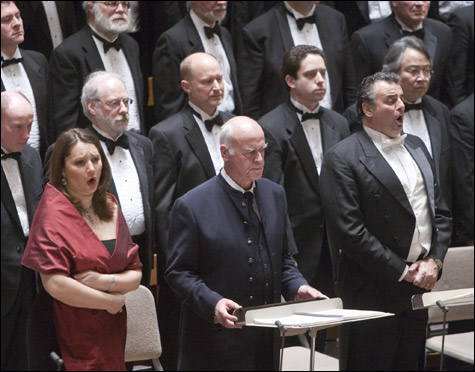
SIMON BOCCANEGRA: Barbara Frittoli's clear, relatively textureless soprano was ideal for the innocent yet strong Amelia, and her voice reached effortlessly into the stratosphere. |
For the first time since James Levine became music director of the Boston Symphony Orchestra, this acclaimed Verdi specialist conducted the BSO in a Verdi opera (though at Tanglewood he led Don Carlo with the student orchestra). He chose one of his favorites: Simon Boccanegra — an opera he's championed for more than 40 years (two of his Metropolitan Opera performances are on DVD), but far from Verdi's most popular piece. (Might one of Verdi's other, more dramatic titles — something about a corsair or the force of destiny — have been more seductive?) Who was this Boccanegra? Aren't the political intrigues between 14th-century Guelphs and Ghibellines migraine territory for anyone who hasn't majored in Italian history?
But it's a very great opera, one of Verdi's darkest. ("All happiness on earth is a cruel illusion" is a line in the last act.) And it has an interesting history. Based on a play by García Gutiûrrez, the Spanish author who was also the source of one of Verdi's most beloved works, Il trovatore, Simon Boccanegra falls between two other ambitious but less than successful operas. Twenty-two years later, Verdi returned to it, with the help of his greatest librettist, Arrigo Boito, who would soon collaborate with him on his two last Shakespeare masterpieces, Otello and Falstaff. There was a thorough musical revision, and they added what is now known as the "Council Chamber" scene — one of the greatest ensembles in all opera.

In this unforgettable scene, Boccanegra, the former corsair who 25 years earlier (in the Prologue) was chosen doge of Genoa, has been reunited with his long-lost daughter, Amelia (who earlier in the act has been both abducted and rescued), and he has to deal with an uprising led (I think) by Gabriele Adorno, his daughter's lover. Soaring above the voices of his enemies, Boccanegra sings one of Verdi's most noble melodies, to the words "I go crying out for peace! I go crying out for love!" And Amelia, in a magnificent, high-arching soprano prayer for peace, tries to calm her lover and the crowd, her voice fluttering back down to earth and ending the scene with an angelic trill. Boccanegra makes everyone curse the unnamed villain behind both the insurrection and Amelia's abduction. Paolo, his former friend and supporter, is forced to curse himself.
Subtle and magical orchestral details paint vivid pictures of the sea and starlit sky, or snake around the voices, insinuating themselves into the action. Ominous brasses remind one of Verdi's Requiem or forecast the downfall of Otello; shimmering strings and winds recall the delicacy of Aida's "Nile Scene"; deep voices hark back to the pain of King Philip and his meeting with the Grand Inquisitor in Don Carlo. Both Amelia and Adorno have memorable arias, and they share a ravishing love duet, and there's an even more touching duet for the reunited father and daughter. When Boccanegra is poisoned by Paolo, his growing weakness is embodied in the music as he recalls his former life as pirate and seafarer. The plot is hard to follow even for those who love this opera. But Verdi's music is so stirring, so gripping, and so heart-stoppingly gorgeous, it's no wonder that those who know it love it.
Drawing on his New York connections, Levine cast four of the leading roles with Met stars. As Simon, the legendary 68-year-old Belgian bass-baritone Josû van Dam, a frequent BSO guest, gave a towering performance. I was astonished to learn that he was at the tail end of a cold. His voice is no longer as ripe or plush as it once was, but he conveyed both Boccanegra's backbone and the man's capacity for love, his ruthlessness and his nobility. Van Dam's voice grew thinner in the second half — was that due to age or his illness? Or was it the subtlety of his characterization? Boccanegra's death was the most moving scene in the opera.
Barbara Frittoli's clear, relatively textureless soprano was ideal for the innocent yet strong Amelia. Her voice reached effortlessly into the stratosphere, though at the first of these concerts, she had no trill, and so one of Verdi's most exquisite touches remained unheard. Italian tenor Marcello Giordani, last season's Aeneas in the BSO's great performances of Berlioz's Les Troyens, has power to spare and an ideal Verdi ring. He's not much of an actor, and his continual scooping up to the notes became an irritating mannerism, but he nailed his big aria and brought down the house. The remnants of bronchitis compromised the efforts of veteran American bass-baritone James Morris, as Fiesco, Boccanegra's longstanding nemesis and Amelia's secret grandfather. He was replaced in the Saturday concert by a younger Met regular, bass Raymond Aceto, who two nights earlier had made a strong impression as Paolo's sinister henchman, Pietro. And as Paolo, rising Sicilian baritone Nicola Alaimo made the single most powerful impression, projecting wiliness and desperation with his focused, resonating dark tone. If he plays comedy (he sings Falstaff and Leporello) as well as he plays malice, he could become a real operatic force.